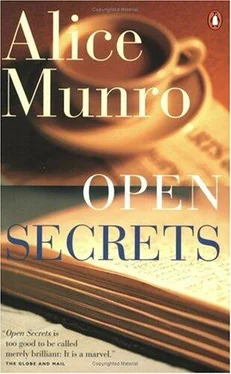Mrs. Monk was to Rhea the most interesting person in the room. Her legs were bare but she wore high heels. They were tapping all the time on the floorboards. Around the table, back and forth from the sideboard where the whisky bottles were (and where she would pause, to write things down on a pad of paper — Rhea’s Coca-Cola, the broken glass). Tap-tap-tap down the back hall to some supply base from which she returned with a clutch of beer bottles in each hand. She was as watchful as a deaf-mute, and as silent, catching every signal around the table, responding obediently, unsmilingly, to every demand. This brought to Rhea’s mind the rumors there were about Mrs. Monk, and she thought of another sort of signal a man might make. Mrs. Monk would lay aside her apron, and she would precede him out of the room into the front hall, where there must be a stairway, leading to the bedrooms. The other men, including her husband, would pretend not to notice. She would mount the stairs without looking back, letting the man follow with his eyes on her neat buttocks in her schoolteacher’s skirt. Then, on a waiting bed, she arranges herself without the least hesitation or enthusiasm. This indifferent readiness, this cool accommodation, the notion of such a quick and driven and bought and paid-for encounter, was to Rhea shamefully exciting.
To be so flattened and used and hardly to know who was doing it to you, to take it all in with that secret capability, over and over again.
She thought of Wayne coming out of the front hall just as she and Billy were being brought into the room. She thought, What if he was coming from up there? (Later he told her that he had been using the phone — phoning Lucille, as he had promised. Later she came to believe those rumors were false.)
She heard a man say, “Watch your language.”
“A call of nature, then, all right, a call of nature.”
Eunie Morgan’s house was the third one past Monk’s. It was the last house on the road. Around midnight, Eunie’s mother said, she had heard the screen door close. She heard the screen door and thought nothing of it. She thought of course that Eunie had gone out to the toilet. Even by 1953 the Morgans had no indoor plumbing.
Of course none of them went as far as the toilet, late at night. Eunie and the old woman squatted on the grass. The old man watered the spirea at the far end of the porch.
Then I must have gone to sleep, Eunie’s mother said, but I woke up later on and I thought that I never heard her come in.
She went downstairs and walked around in the house. Eunie’s room was behind the kitchen, but she might be sleeping anywhere on a hot night. She might be on the couch in the front room or stretched out on the hall floor to get the breeze between the doors. She might have gone out on the porch where there was a decent car seat that her father, years ago, had found discarded farther down the road. Her mother could not find her anywhere. The kitchen clock said twenty past two.
Eunie’s mother went back upstairs and shook Eunie’s father till he woke up.
“Eunie’s not down there,” she said.
“Where is she, then?” said her husband, as if it was up to her to know. She had to shake him and shake him, to keep him from going back to sleep. He had a great indifference to news, a reluctance to listen to what anybody said, even when he was awake.
“Get up, get up,” she said. “We got to find her.” Finally he obeyed her, sat up, pulled on his trousers and his boots. “Get your flashlight,” she told him, and with him behind her she went down the stairs again, out onto the porch, down into the yard. It was his job to shine the flashlight — she told him where. She directed him along the path to the toilet, which stood in a clump of lilacs and currant bushes at the back of the property. They poked the light inside the building and found nothing. Then they peered in among the sturdy lilac trunks — these were practically trees — and along the path, almost lost now, that led through a sagging section of the wire fence to the wild growth along the riverbank. Nothing there. Nobody.
Back through the vegetable garden they went, lighting up the dusted potato plants and the rhubarb that was now grandly gone to seed. The old man lifted a great rhubarb leaf with his boot, shone the light under that. His wife asked whether he had gone crazy.
She recalled that Eunie used to walk in her sleep. But that was years ago.
She spotted something glinting at the corner of the house, like knives or a man in armor. “There. There,” she said. “Shine it there. What’s that?” It was only Eunie’s bicycle, which she rode to work every day.
Then the mother called Eunie’s name. She called it at the back and at the front of the house — plum trees grew as high as the house in front and there was no sidewalk, just a dirt path between them. Their trunks crowded in like watchers, crooked black animals. When she waited for an answer, she heard the gulp of a frog, as close as if it sat in those branches. Half a mile farther on, this road ended up in a field too marshy for any use, with weedy poplars growing up through the willow bushes and elderberries. In the other direction, it met the road from town, then crossed the river and climbed the hill to the chicken farm. On the river flats lay the old fairgrounds, some grandstands abandoned since before the war, when the fair here was taken over by the big fair at Walley. The racetrack oval was still marked out in the grass.
This was where the town set out to be, over a hundred years ago. Mills and hostelries were here. But the river floods persuaded people to move to higher ground. House-plots remained on the map, and roads laid out, but only the one row of houses where people lived was still there, people who were too poor or in some way too stubborn to change — or, at the other extreme, too temporary in their living arrangements to object to the invasion of the water.
They gave up — Eunie’s parents did. They sat down in the kitchen without any light on. It was between three and four o’clock. It must have seemed as if they were waiting for Eunie to come and tell them what to do. It was Eunie who was in charge in that house, and they probably could hardly imagine a time when it had been otherwise. Nineteen years ago she had literally burst into their lives. Mrs. Morgan had thought she was having the change and getting stout — she was stout enough already that it did not make much difference. She thought the commotion in her stomach was what people called indigestion. She knew how people got children, she was not a dunce — it was just that she had gone on so long without any such thing happening. One day in the post office she had to ask for a chair, she was weak and overcome by cramps. Then her water broke, she was hustled over to the hospital, and Eunie popped out with a full head of white hair. She was claiming attention from the moment of her birth.
One whole summer, Eunie and Rhea played together, but they never had thought of their activity as play. Playing was what they called it to satisfy other people. It was the most serious part of their lives. What they did the rest of the time seemed frivolous, forgettable. When they cut from Eunie’s yard down to the riverbank, they became different people. Each of them was called Tom. The Two Toms. A Tom was a noun to them, not just a name. It was not male or female. It meant somebody exceptionally brave and clever but not always lucky, and — just barely — indestructible. The Toms had a battle which could never end and this was with the Bannershees. (Perhaps Rhea and Eunie had heard of banshees.) The Bannershees lurked along the river and could take the form of robbers or Germans or skeletons. Their tricks and propensities were endless. They laid traps and lay in ambush and tortured the children they had stolen. Sometimes Eunie and Rhea got some real children — the McKays, who lived briefly in one of the river houses — and persuaded them to let themselves be tied up and thrashed with cattails. But the McKays could not or would not submit themselves to the plot, and they soon cried or escaped and went home, so that it was just the Toms again.
Читать дальше












